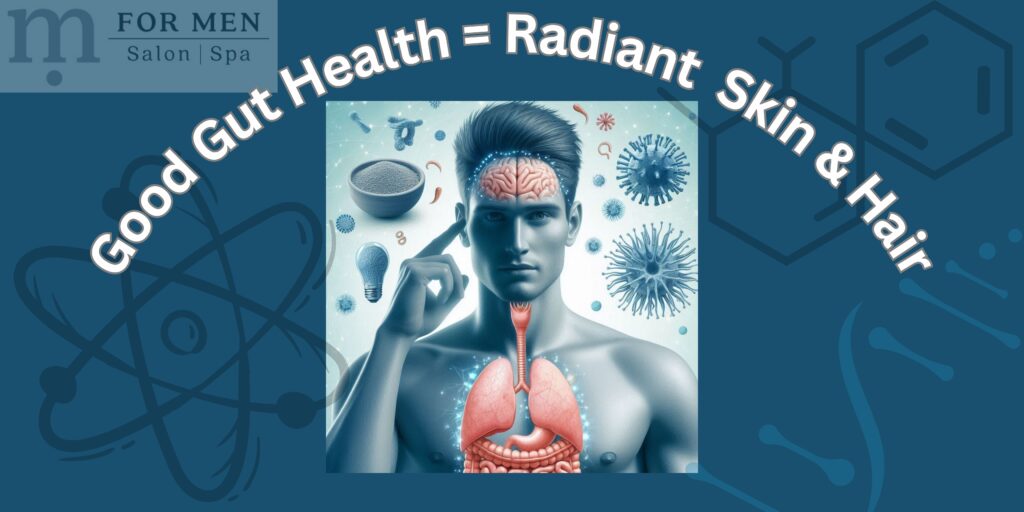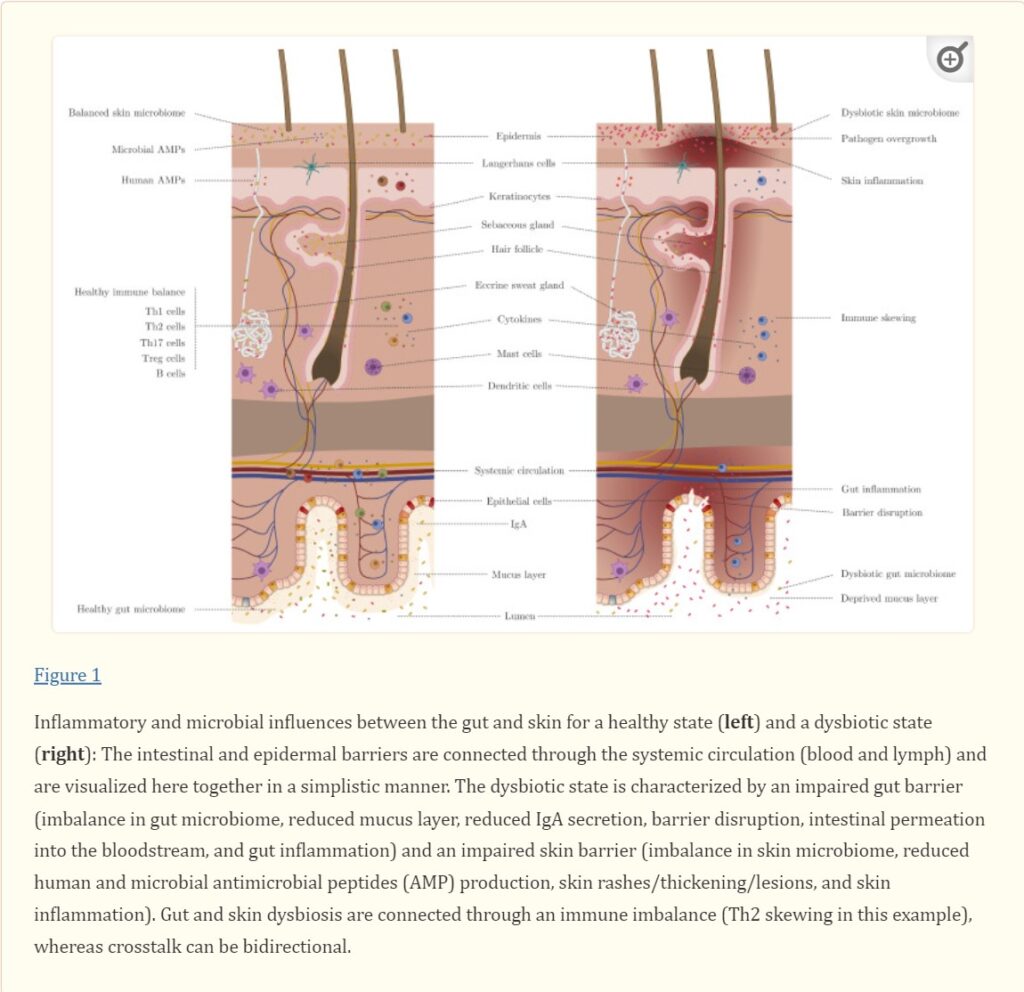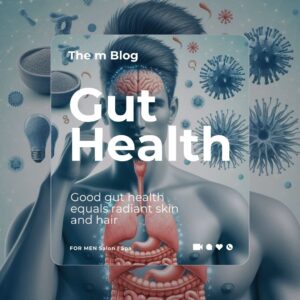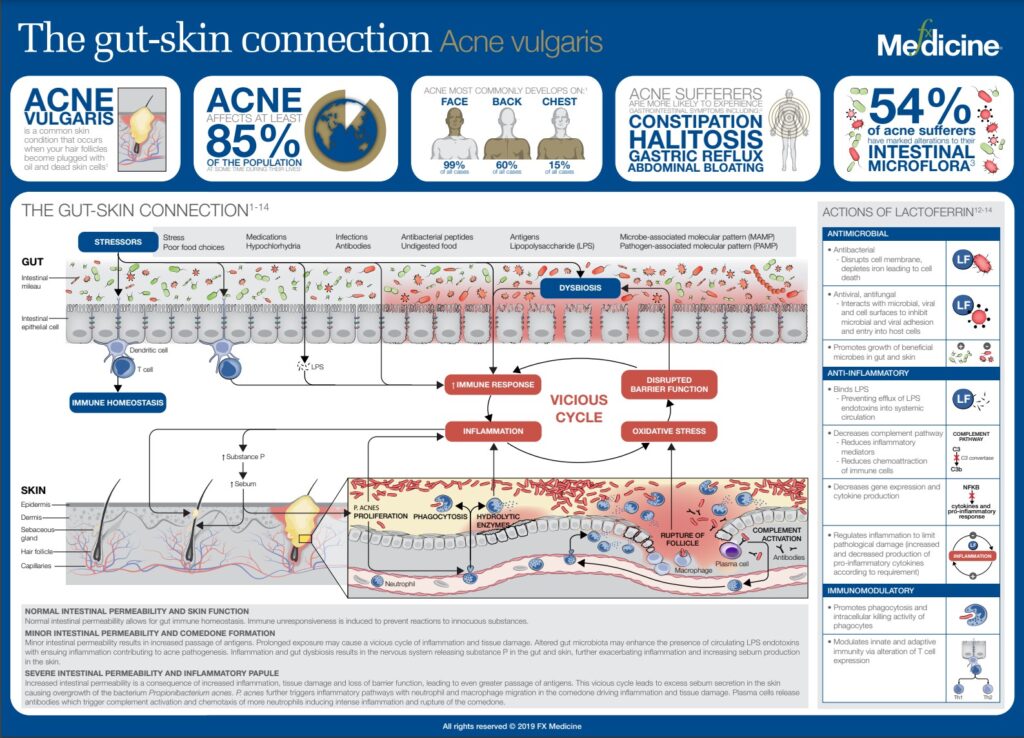
In recent years, research has increasingly highlighted the critical role that gut health plays in overall well-being. Most people understand its connection to digestion and immunity. However, few people know that skin and hair condition is intricately linked to gut health. A healthy gut does not just impact how people feel internally. It can also have visible effects on our external appearance, particularly regarding hair growth and skin clarity. This blog post will examine the connection between the gut and hair and skin health. We will explore why maintaining a balanced gut biome is the key to achieving a radiant complexion and strong, lustrous hair.
The Gut-Skin Axis: How Gut Health Affects Skin
The relationship between gut health and skin health is often called the gut-skin axis. This concept suggests that the state of your gastrointestinal system directly influences your skin’s condition. Mainly through the gut microbiome. The gut microbiome is an ecosystem of trillions of bacteria, fungi, and other microorganisms living in the digestive tract. When this ecosystem is disturbed, this process is a condition known as dysbiosis.
When the balance of these microorganisms is disturbed, it can:
- Trigger inflammation
- Weaken the immune system
- Disrupt the skin’s natural barrier
Dysbiosis Defined
Dysbiosis refers to an imbalance or maladaptation in the microbial communities, particularly in the gut microbiome. It can occur in other parts of the body, such as the skin, mouth, or hair. The human microbiome is composed of trillions of microorganisms. This includes bacteria, fungi, viruses, and protozoa. They usually coexist in a balanced state, contributing to health and homeostasis. When this balance is disrupted, it leads to dysbiosis, which can have significant health implications.
Key Aspects of Dysbiosis:
Gut Microbiome Balance
- In a healthy state, the gut microbiome maintains a balance between beneficial and potentially harmful microorganisms. The “good” bacteria help with digestion, immune function, and preventing the overgrowth of harmful pathogens. Dysbiosis refers to a shift in this balance, where harmful microorganisms outnumber beneficial ones. It can also refer to specific microbial populations that are missing or diminished.
Types of Dysbiosis
- Loss of beneficial bacteria: A reduction in important species, such as those in the Lactobacillus or Bifidobacterium genera, can leave room for harmful organisms to dominate.
- Overgrowth of harmful bacteria: Certain opportunistic or pathogenic bacteria may overgrow. For example, Clostridium difficile infections are common after antibiotic use, which disrupts the normal microbiota.
- Loss of microbial diversity: A healthy microbiome is diverse. Loss of this diversity can impair the body’s ability to respond to environmental changes and increase vulnerability to disease.
Causes of Dysbiosis
- Diet: Diets high in processed foods, sugars, and unhealthy fats can disrupt the gut microbiota. Conversely, fiber-rich diets, fermented foods, and prebiotics support a balanced microbiome.
- Antibiotics: Antibiotics treat infections by killing bacteria. They are non-selective and often kill beneficial bacteria, leading to dysbiosis.
- Chronic Stress: Stress hormones can alter the gut environment and lead to changes in microbial composition.
- Environmental Toxins: Exposure to pollutants, pesticides, or chemicals may negatively impact microbial health.
- Chronic Infections: Long-standing infections or repeated antibiotic use may contribute to microbial imbalance.
- Gut Motility Issues: Conditions like irritable bowel syndrome (IBS) or small intestinal bacterial overgrowth (SIBO) can result in dysbiosis. This happens when bacteria may accumulate in areas where they usually don’t thrive.
Symptoms of Dysbiosis
- Digestive Issues: Common symptoms include bloating, gas, diarrhea, constipation, indigestion, or heartburn. Conditions like IBS are often associated with dysbiosis.
- Inflammation: Dysbiosis can cause chronic low-grade inflammation in the gut, which may spread to other parts of the body.
- Immune Dysfunction: The gut microbiota plays a key role in regulating the immune system. Dysbiosis can lead to immune imbalances, contributing to allergies, autoimmune diseases, or frequent infections.
- Mental Health Effects: Gut health is closely linked to mental health via the gut-brain axis. Dysbiosis may contribute to anxiety, depression, or mood swings.
- Skin Problems: Dysbiosis has been linked to skin conditions such as acne, eczema, and rosacea. This is often referred to as part of the gut-skin axis.
Health Conditions Associated with Dysbiosis
- Inflammatory Bowel Diseases (IBD): Diseases like Crohn’s disease and ulcerative colitis are closely linked to an imbalance in the gut microbiota.
- Obesity and Metabolic Syndrome: Research has shown that dysbiosis is associated with weight gain, insulin resistance, and other metabolic issues.
- Autoimmune Diseases: Dysbiosis can lead to immune system dysregulation. This may contribute to conditions such as rheumatoid arthritis, multiple sclerosis, or type 1 diabetes.
- Mental Health Disorders: There is growing evidence that dysbiosis can influence mental health conditions like depression, anxiety, and even cognitive impairments.
- Allergies and Asthma: Changes in the microbiome are thought to influence immune responses, increasing the risk of allergic diseases.
- Cardiovascular Disease: Dysbiosis, particularly in relation to the metabolism of certain nutrients, has been linked to an increased risk of heart disease.
Diagnosis of Dysbiosis
- Stool Tests: Comprehensive stool analyses can reveal microbial composition, pathogens’ presence, and inflammation markers.
- Breath Tests: In cases of SIBO, a breath test may measure levels of hydrogen or methane produced by bacteria in the small intestine.
- Genetic Sequencing: Advanced techniques like 16S ribosomal RNA sequencing or metagenomic sequencing can provide detailed insights into the gut’s microbial composition and diversity.
Treatment of Dysbiosis
- Probiotics: Live bacteria that help restore the balance of the gut microbiota. Probiotic strains like Lactobacillus and Bifidobacterium are commonly used to treat dysbiosis.
- Prebiotics: Non-digestible food ingredients, like certain fibers, stimulate beneficial bacteria’ growth and activity.
- Dietary Changes: Eating a diet rich in fiber and fermented foods and avoiding processed foods can support gut health.
- Fecal Microbiota Transplant (FMT): In severe cases, like recurrent C. difficile infections, FMT involves transferring fecal bacteria from a healthy donor to the patient to restore balance.
- Antimicrobials: In some cases, antibiotics, antifungals, or other antimicrobials may target harmful overgrowth. These are followed by probiotics to replenish the microbiome.
Dysbiosis is a condition in which the balance of microorganisms in the microbiome is disrupted, leading to potential health problems. Restoring balance through diet, lifestyle changes, and targeted treatments like probiotics can improve health outcomes. Understanding dysbiosis is critical for addressing various chronic and systemic health issues.
The Dysbiosis Cyce | Unbalanced Gut Health
The dysbiosis cycle refers to a self-perpetuating imbalance in the gut microbiome. This happens when harmful bacteria or other microorganisms outnumber beneficial ones. This disruption in microbial balance often stems from factors like poor diet, stress, illness, antibiotic use, or environmental toxins. As harmful microbes proliferate, they produce toxins and inflammatory compounds that damage the intestinal lining. Leading to increased intestinal permeability (leaky gut). This allows harmful substances to enter the bloodstream, triggering immune responses and chronic inflammation. The resulting inflammation further disrupts the gut environment. This worsens dysbiosis and creates a vicious cycle that can contribute to various health issues. Including digestive disorders, metabolic conditions, and autoimmune diseases.
1. Inflammation and Skin Disorders
Poor gut health can lead to chronic inflammation. Chronic inflamation often manifests as skin conditions such as acne, eczema, rosacea, and psoriasis. Inflammation in the gut may cause an immune response, increasing systemic inflammation that often shows up on the skin. Research suggests that patients with these skin disorders frequently show signs of gut dysbiosis.
2. Leaky Gut and Skin Health
Another key issue tied to gut health is leaky gut syndrome. When the gut lining becomes permeable, toxins, undigested food particles, and harmful bacteria can leak into the bloodstream. This causes widespread inflammation. This “leaky” barrier often exacerbates skin conditions. Triggering reactions such as breakouts, redness, or flare-ups in individuals prone to inflammatory skin diseases.
3. Nutrient Absorption
A healthy gut ensures proper digestion and absorption of nutrients critical for maintaining healthy skin. Essential vitamins and minerals, such as zinc, biotin, vitamin A, and omega-3 fatty acids, are crucial for skin:
- repair
- hydration
- protection
A compromised gut may not effectively absorb these nutrients. Leading to dull, dry skin, and in more extreme cases, skin conditions linked to deficiencies.
Gut Health and Hair: The Unseen Connection

Like the skin, hair is highly sensitive to gut health. The connection between the two is often overlooked, but it plays a significant role in hair growth, strength, and overall vitality.
1. Nutrient Deficiencies and Hair Loss
Much like the skin, the health of hair follicles depends on a range of nutrients, including biotin, vitamins B12, D, and E, and essential fatty acids. These nutrients are absorbed in the gut, meaning poor gut health can lead to deficiencies. When these essential nutrients are not adequately absorbed, hair follicles may become weak, leading to hair thinning, dullness, or even hair loss.
A deficiency in biotin or iron, for example, can cause significant hair shedding or slow down the rate of hair growth. Poor gut health also affects thyroid function, further disrupting the hair growth cycle and leading to premature hair loss.
2. Inflammation and Hair Follicles
Inflammation caused by dysbiosis or leaky gut syndrome also impacts hair follicles. Like skin cells, hair follicles are sensitive to inflammatory signals from the body. Chronic inflammation may impair the hair growth cycle, particularly the anagen (growth) phase, resulting in hair thinning and slow regrowth.
3. Gut Microbiome and Hormonal Balance
Gut health also profoundly impacts hormone regulation, which plays a critical role in hair health. The gut microbiome helps regulate hormones such as cortisol and androgens, which can contribute to hair thinning or loss when imbalanced. Elevated cortisol levels, often associated with stress and poor gut health, can push hair follicles into a resting phase. Causing increased shedding.
Steps to Improve Gut Health for Better Hair and Skin
Optimizing your gut health can lead to noticeable improvements in both your skin and hair. Here are some science-backed strategies to consider:
1. Prebiotics and Probiotics
Incorporating prebiotics (fibers that feed good bacteria) and probiotics (live beneficial bacteria) into your diet is one of the most effective ways to improve gut health. Foods like yogurt, kefir, sauerkraut, kimchi, and fiber-rich vegetables help maintain a balanced microbiome, reducing inflammation and promoting nutrient absorption.
2. Reduce Inflammatory Foods
Processed foods, refined sugars, and excessive alcohol consumption can disrupt the gut microbiome, contributing to inflammation and poor nutrient absorption. Replacing these with anti-inflammatory foods such as leafy greens, fatty fish, nuts, and seeds can help reduce systemic inflammation. These types of foods support both gut and skin health.
3. Stay Hydrated
Proper hydration is essential for digestion and maintaining a healthy gut lining. Dehydration can lead to poor digestion and nutrient absorption. Dehydration impacts the skin’s hydration, elasticity, and strength of hair follicles.
4. Manage Stress
Stress can have a negative impact on both gut health and the condition of your skin and hair. High-stress levels disrupt gut bacteria and increase cortisol levels, leading to hair loss and skin inflammation. Incorporating stress-relieving practices such as mindfulness, yoga, or regular exercise can help maintain hormonal balance and reduce inflammation.
5. Consult with a Healthcare Professional
If you suspect gut issues like leaky gut syndrome, SIBO (small intestinal bacterial overgrowth), or other digestive disorders, it’s essential to consult with a healthcare provider. They can help diagnose underlying gut problems and recommend treatments or dietary changes to restore balance.
The Gut Health Priority

Maintaining a healthy gut is about much more than digestion. It also plays a vital role in the health of the skin and hair. By paying attention to gut health, people may improve their internal wellness and achieve healthier, clearer skin and stronger, more vibrant hair. The gut microbiome is better supported through mindful dietary choices, stress management, and proper hydration. Then, by extension, skin and hair have a healthier, more radiant appearance.
Skin and Gut Health: The Radiance Connection
The skin is often referred to as the body’s largest organ, and its condition can reflect what’s going on internally. Especially in the gut. A well-functioning gut contributes to clear, hydrated, and radiant skin. Due to several physiological processes that directly link gut health to skin vitality.
Hair Health and the Gut: Strength and Shine
Healthy hair is often associated with a well-functioning gut. Just as the skin reflects internal health, hair condition is also influenced by the gut’s ability to absorb key nutrients and maintain a balanced internal environment. Hair grows from follicles nourished by a constant supply of nutrients carried by the bloodstream. The health of these follicles is directly tied to gut function.
The Gut-Skin-Hair Axis: A Holistic Approach
In many ways, the condition of a person’s skin and hair can mirror their internal health, particularly their gut health. When the gut is in good condition, the benefits extend outward. Good gut health creates a vibrant appearance. This connection is often called the “gut-skin axis” or the “gut-hair axis.” This axis is where the gut’s health is intimately linked to the skin and hair through nutrient absorption, inflammation control, and hormonal balance.
People with good gut health often exhibit glowing skin that is free from breakouts and irritation and has strong, shiny hair that resists breakage. The complexion tends to be even-toned and youthful. The skin will have fewer fine lines as collagen production and hydration levels are optimized. Hair is usually fuller and more resilient, thanks to the gut’s ability to process and deliver vital nutrients.
Good gut health leads to a radiant, youthful appearance. It directly affects the body’s ability to maintain healthy skin and hair. The gut is the foundation for beauty that truly shines from the inside out through balanced microbiomes, reduced inflammation, and optimal nutrient absorption.
FOR MEN Salon and Spa | Great Hair and Skin

While a men’s salon may not be equipped to diagnose gut health issues formally, they can play a role in recognizing signs that point to an unhealthy gut microbiome. Especially by observing the client’s skin, scalp, and hair condition. Stylists and grooming professionals are often the first to notice physical changes related to health. Including gut-related imbalances, and can encourage clients to seek medical advice if needed. Here’s how a men’s salon can help identify potential gut health problems:
Observing Hair and Scalp Issues
The hair and scalp are closely linked to overall health. Issues in these areas can be early signs of gut dysbiosis or other imbalances. A stylist at a men’s salon might notice the following indicators of poor gut health:
- Excessive Hair Shedding or Thinning: If a client is experiencing more than the usual amount of hair loss, this can sometimes be linked to poor nutrient absorption. This is common in people with gut health issues. Nutrients like biotin, zinc, and iron are vital for hair growth. If the gut microbiome is imbalanced, these nutrients may not be adequately absorbed, leading to hair loss.
- Dry, Brittle Hair: Dry, weak, or brittle hair may indicate that the body is lacking essential fatty acids or other nutrients. This can occur when gut health is compromised. Gut inflammation or malabsorption of fats and proteins may contribute to hair losing its shine and strength.
- Scalp Irritation: A dry, flaky, or itchy scalp can indicate internal inflammation, which can be caused by gut issues like dysbiosis or leaky gut. Conditions such as dandruff or scalp psoriasis may flare up when a bacterial imbalance occurs in the gut.
Skin Condition Observations
Men’s salons often offer skincare services such as facials, and they may notice specific skin issues that could point to gut health problems:
- Acne, Especially Around the Jawline: Hormonal imbalances influenced by gut health can often result in acne breakouts. A client experiencing persistent or severe acne, particularly around the jawline and chin, could indicate gut inflammation or poor gut microbiome health. The gut is directly connected to hormone regulation. Imbalances often manifest in breakouts.
- Rosacea or Redness: Rosacea and facial redness may be linked to gut-related issues. Inflammation in the gut can trigger immune responses that result in these skin conditions. If a stylist notices worsening rosacea or chronic facial redness in a client, it could indicate that the client’s gut health needs attention.
- Dry, Dull, or Irritated Skin: A salon professional might notice if a client’s skin looks particularly dull, dry, or irritated, which could suggest issues with hydration or nutrient absorption related to gut health. A healthy gut is key to maintaining balanced hydration levels and absorbing vitamins that support skin radiance, like vitamins A, C, and E.
Changes in Hair Texture or Growth Patterns
Stylists who regularly see their clients can track changes in hair texture or growth patterns over time. A sudden change in hair texture—such as hair becoming unusually coarse or thin—could indicate underlying nutritional deficiencies related to poor gut health. Gut problems can also affect how quickly hair grows, so any noticeable slowdowns in hair growth might signal an issue.
Nail Health Observations
Some men’s salons offer manicures or grooming services for nails, and nails can serve as a visual clue for gut health. Poor gut health can affect nail strength, leading to brittle, weak, or peeling nails. This can result from poor nutrient absorption, particularly a lack of biotin, zinc, or protein, which are crucial for nail growth and strength. If a salon professional notices significant changes in nail health, it may suggest underlying gut issues.
General Grooming Discussions and Lifestyle Habits
Men’s salon professionals often develop a close rapport with their clients, making it easy to discuss lifestyle habits that may influence gut health casually. They can ask questions about diet, stress levels, or digestive issues, which can help identify potential signs of an unhealthy gut. For instance, if a client frequently complains of bloating, digestive discomfort, or chronic fatigue, these could be signs of gut dysbiosis. Though salon professionals aren’t doctors, they can encourage their clients to consult a healthcare provider for further evaluation if they suspect gut issues based on their observed symptoms.
Product Recommendations for Hair and Skin
While not diagnostic, salons can guide clients toward better scalp, skin, and hair care by recommending products that support a healthy external environment. This may indirectly alleviate some gut-related symptoms. For example, recommending products with probiotics or prebiotics or scalp treatments with anti-inflammatory ingredients may help with certain symptoms, though underlying gut health issues still need medical attention.
Encouraging Professional Medical Advice
Finally, a men’s salon can serve as a first line of observation and offer referrals for clients to see dermatologists, nutritionists, or functional medicine practitioners if they notice persistent signs of poor hair and skin health. Stylists can explain that while external treatments help, issues like thinning hair, dry skin, and scalp irritation might benefit from an evaluation of gut health. This could lead to a formal diagnosis and treatment of dysbiosis or other gut-related conditions.
Gut Health and A Men’s Salon
While men’s salons are not diagnostic centers, stylists and grooming professionals are uniquely positioned to observe signs that could indicate poor gut health. Their obversations are caused by changes in the skin, scalp, and hair, and they are maintained by keeping an eye on the condition of these areas. Styleists will engage in discussions about lifestyle and health. They can recommend that clients seek medical advice when they notice signs of gut imbalance. In this way, a men’s salon can be a supportive environment for promoting overall health, including gut health, and helping clients look and feel their best from the inside out.
